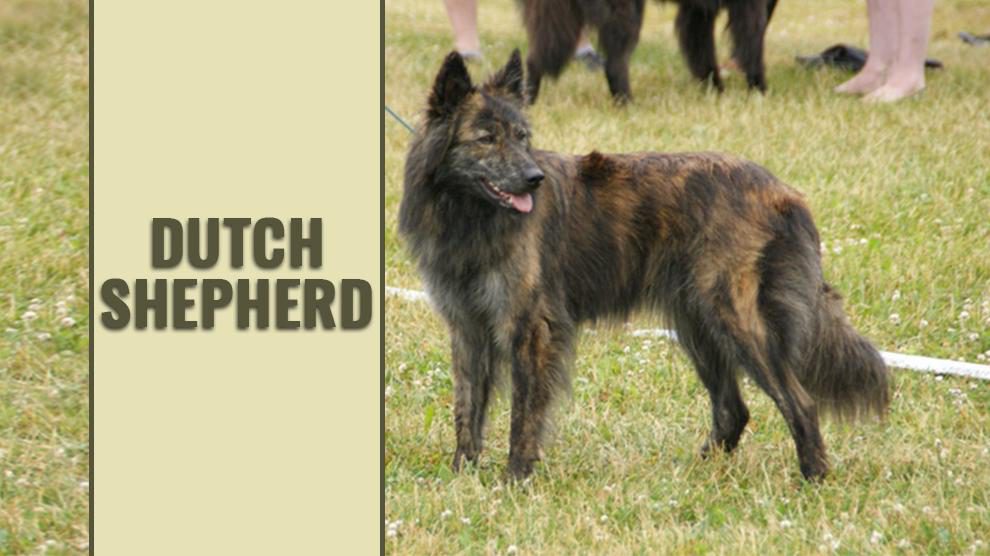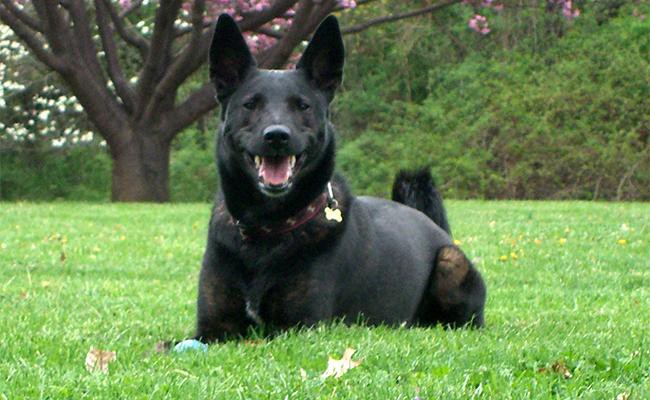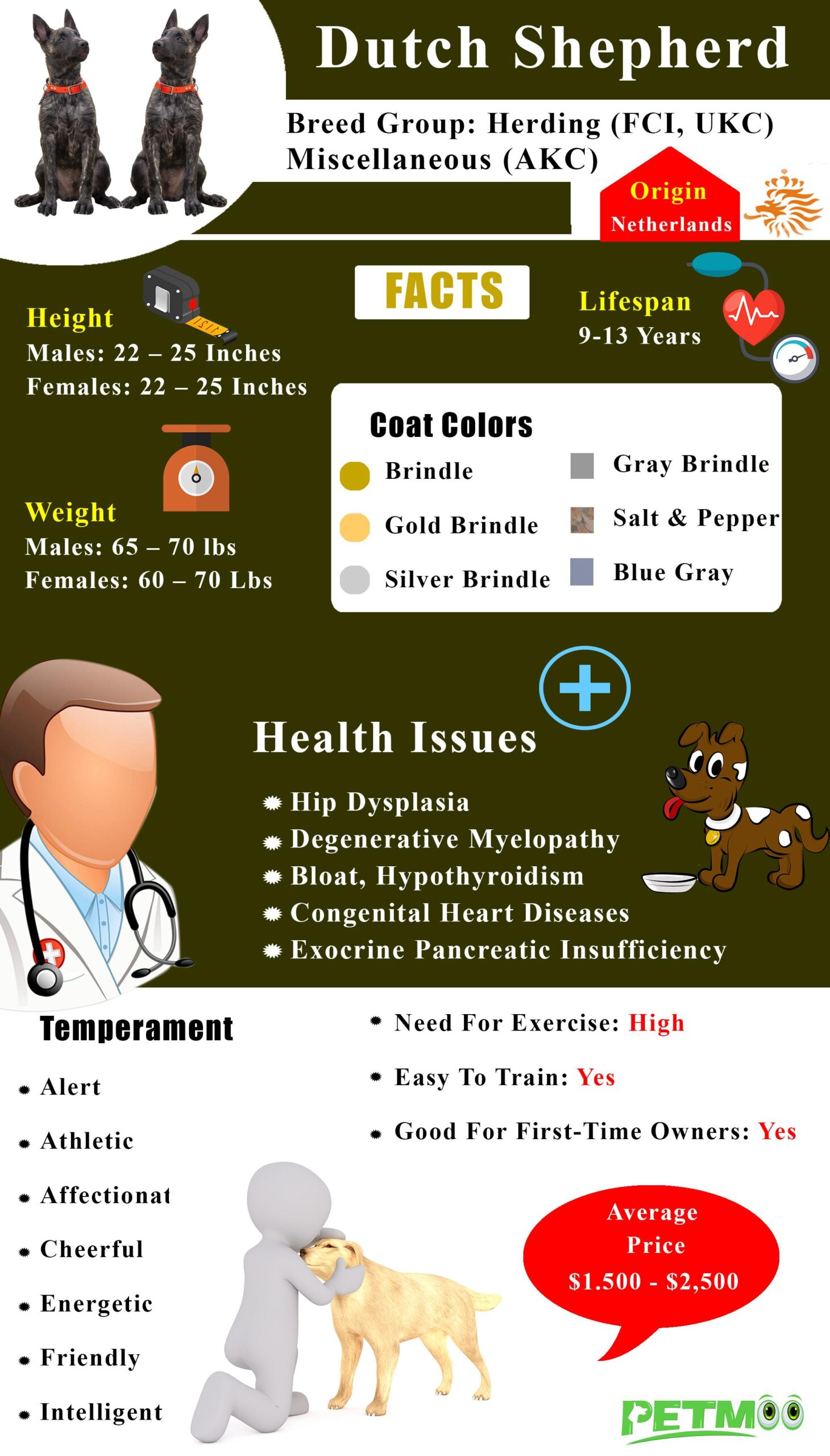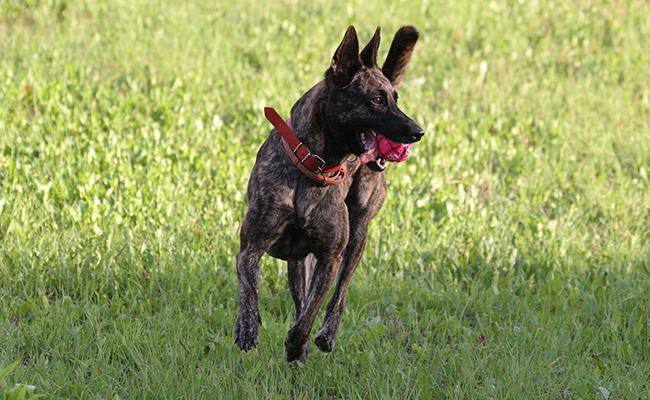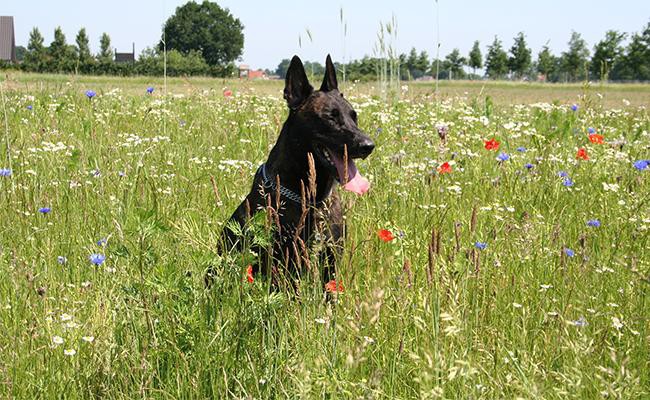Dog Pregnancy Calculator And Timeline
The Dutch Shepherd Dog, also known as the Dutch Shepherd or Hollandse Herdershond, is a versatile and intelligent breed renowned for its working abilities.
This medium-sized dog is highly valued for its loyalty, agility, and versatility, making it a popular choice for various roles, including herding, police work, search and rescue, and competitive sports.
Dutch Shepherd Breed Characteristics
- Origin: Netherlands
- Size: Medium
- Dog Breed Group: Herding (FCI, UKC), Miscellaneous (AKC)
- Purebred: Yes
- Lifespan: 9-13 Years
- Height: Males: 22 – 25 Inches (55 – 60 Cm), Females: 22 – 25 Inches (55 – 60 Cm)
- Weight: Males: 65 – 70 Pounds (29 – 32 Kg) Females: 60 – 70 Pounds (27 – 32 Kg)
- Coat Appearance: Double Coat, Short, Long, And Wirehair Varieties
- Coat Colors: Brindle, Gold Brindle, Silver Brindle, Gray Brindle, Salt & Pepper, Blue Gray
- Temperament: Alert, Athletic, Affectionate, Cheerful, Energetic, Friendly, Intelligent, Lively, Loyal, Protective, Pleasant, Responsive, Social, Spirited, Territorial, Watchful
- Good With Children: Yes
- Intelligence Level: High
- Good With Pets: Yes Under Supervision
- Hypoallergenic: No
- Grooming: High
- Shedding: High
- Barking: When Needed
- Suitable For Apartments: Yes
- Need For Exercise: High
- Easy To Train: Yes
- Good For First-Time Owners: Yes
- Health Issues: Hip Dysplasia, Degenerative Myelopathy, Bloat, Hypothyroidism, Congenital Heart Diseases, And Exocrine Pancreatic Insufficiency
- Litter Size: 5-10
- Average Price: $1000-$1500 USD
Dutch Shepherd History
The Dutch Shepherd Dog has a rich history that can be traced back several centuries. The breed was developed in the Netherlands for herding and guarding livestock.
These dogs played a crucial role in rural areas, helping farmers in managing their flocks and protecting them from predators.
Over time, the Dutch Shepherd’s versatility and intelligence led to its utilization in other fields such as police work and military service.
Dutch Shepherd Size
The Dutch Shepherd Dog is a medium-sized dog with a well-muscled and athletic build.
Males typically stand between 22 to 24 inches (56 to 61 cm) in height at the shoulder, while females are slightly smaller, ranging from 21 to 23 inches (53 to 58 cm).
They have a well-proportioned body with a deep chest and a slightly elongated muzzle. The breed’s ears are naturally erect and triangular, adding to its alert and attentive expression.
Dutch Shepherd Lifespan
On average, Dutch Shepherds have a lifespan of 12 to 15 years. However, with proper care, a healthy Dutch Shepherd can live even longer.
As with any breed, regular veterinary check-ups, a balanced diet, and plenty of exercise are important for maintaining their overall health and well-being.
Dutch Shepherd Temperament
The Dutch Shepherd Dog is known for its intelligence, loyalty, and versatility. They are highly trainable and often excel in various dog sports and working roles.
This breed is known for its strong work ethic and drive, making it suitable for tasks such as herding, obedience, agility, and scent detection.
They are also frequently utilized in police work and search and rescue operations due to their keen senses and high level of trainability.
In addition to their working abilities, Dutch Shepherds make excellent family companions. They are known for their strong bonds with their owners and are often protective and affectionate towards their families.
However, it is important to note that they can be reserved and aloof with strangers, making them excellent watchdogs.
Early socialization and consistent, positive training are essential for shaping the Dutch Shepherd’s temperament. They thrive in an environment where they receive mental and physical stimulation.
Regular exercise, such as long walks, runs, or play sessions, is necessary to prevent boredom and destructive behavior. Mental stimulation through training sessions, puzzle toys, and interactive games is also crucial for their well-being.
Adaptability:
- Apartment Living – Yes
- Good For First-Time Owners – Good
- Sensitivity Level – High
- Loneliness – Hates To Be Left Alone
- Cold Weather – Good
- Hot Weather – Good
Friendliness:
- With Family – High
- With Kids – Good
- With Other Dogs – Good (If Properly Trained)
- With Cats – Good, If Raised Together
- Strangers – Suspicious
General Behavior:
- Independence – Average
- Dominance – High
- Combativeness – Aggressive
- Indoors – Active
- Outdoor – Highly Active
- Territorial – Yes
- Easy Of Transportation – Good
Dutch Shepherd Training
1. Basic Obedience:
– Teach commands like sit, stay, come, and down.
– Use positive reinforcement techniques such as treats and praise.
2. Socialization:
– Introduce your Dutch Shepherd to various people, animals, and environments.
– Encourage positive interactions and reward good behavior.
3. Leash Training:
– Teach loose leash walking and discourage pulling.
– Use a sturdy leash and reward your dog for walking calmly.
4. Agility Training:
– Set up an obstacle course to improve your dog’s coordination and agility.
– Start with basic exercises and gradually increase difficulty.
5. Scent Work:
– Engage your Dutch Shepherd’s natural instinct for tracking scents.
– Use scent detection games or enroll in scent work classes.
Dutch Shepherd Care
1. Exercise:
– Provide daily exercise to meet their high-energy needs.
– Engage in activities like long walks, jogging, or playing fetch.
– Consider participating in dog sports or agility training.
2. Mental Stimulation:
– Engage your Dutch Shepherd’s mind with puzzles, interactive toys, and training sessions.
– Teach new tricks or commands to keep them mentally sharp.
3. Grooming:
– Brush their short, dense coat regularly to minimize shedding.
– Bathe them as needed, typically every few months.
– Trim their nails regularly and clean their ears to prevent infections.
4. Health:
– Schedule regular veterinary check-ups and vaccinations.
– Maintain a balanced diet with high-quality dog food to support their overall health.
– Watch for signs of common health issues like hip dysplasia or allergies.
5. Socialization:
– Expose your Dutch Shepherd to various environments, people, and animals from a young age.
– Allow them to interact with other well-behaved dogs to develop good social skills.
6. Training and Discipline:
– Consistently enforce rules and boundaries to maintain control and prevent behavioral issues.
– Use positive reinforcement techniques like treats, praise, and rewards to encourage desired behavior.
Dutch Shepherd Food
The Dutch Shepherd requires a high-quality, balanced diet to support its active lifestyle and overall health.
A nutritionally complete dog food formulated for medium-sized breeds is a good choice. Look for a food that lists a high-quality source of protein, such as chicken or lamb, as the main ingredient.
Avoid foods that contain fillers, artificial additives, or excessive amounts of grains. Feeding the appropriate portion size based on your dog’s age, weight, and activity level is important to prevent obesity.
It’s always a good idea to consult with your veterinarian to determine the best diet plan for your Dutch Shepherd.
Top 10 Best Dutch Shepherd Home Foods
Dutch Shepherd Grooming
The Dutch Shepherd Dog has a short, dense coat that requires minimal grooming. Weekly brushing is usually sufficient to keep their coat clean and healthy, as it helps remove loose hair and prevents matting.
This breed typically sheds moderately throughout the year, with heavier shedding occurring during seasonal changes. Additionally, regular dental care, nail trimming, and ear cleaning are essential parts of their grooming routine.
Dutch Shepherd Shedding
- Coat Density – Normal
- Coat Length – Medium
- Coat Texture – Straight
- Brushing Frequency – Daily
- Trimming/Stripping – Yes
- Hypoallergenic – No
- Shedding – High
Dutch Shepherds are moderate shedders. They have a short, dense double coat that requires regular brushing to minimize shedding and keep their coat healthy.
Shedding usually occurs twice a year when they “blow” their coat, meaning they shed their undercoat to prepare for seasonal changes. During these times, more frequent brushing may be necessary to remove loose hair.
Providing a balanced diet with essential nutrients can also help maintain a healthy coat and reduce excessive shedding.
While Dutch Shepherds do shed, their grooming needs are relatively manageable compared to some other breeds with longer or more profuse coats.
Dutch Shepherd Names
Dutch Shepherd Male Names
- Butch
- Barend
- Bruno
- Duke
- Magnus
- Max
- Rex
- Rocky
- Shadow
- Zeus
Dutch Shepherd Female Names
- Anika
- Belle
- Daisy
- Edda
- Maggie
- Molly
- Sasha
- Sadie
- Taffy
- Zara
Dutch Shepherd Health Issues
Overall, the Dutch Shepherd Dog is a robust and healthy breed. However, like all dogs, they can be prone to certain health issues.
Some common health concerns include hip and elbow dysplasia, which can cause pain and mobility issues. Additionally, eye problems such as progressive retinal atrophy and cataracts have been reported in some Dutch Shepherds.
Responsible breeders perform health screenings and tests to minimize the risk of these conditions in their breeding lines.
Dutch Shepherd Price
The price of a Dutch Shepherd Dog can vary depending on various factors such as the breeder’s reputation, the bloodline of the dog, and its intended purpose.
On average, you can expect to pay between $1,500 to $2,500 for a Dutch Shepherd puppy from a reputable breeder.
It is crucial to do thorough research and choose a responsible breeder who prioritizes the health and temperament of their dogs.
Dutch Shepherd Breeders
A reputable breeder will provide health clearances for the parents, offer guidance and support, and allow you to meet the puppies and their parents before making a decision.
They will also be knowledgeable about the breed, provide proper socialization for the puppies, and be available for any questions or concerns you may have throughout the dog’s lifetime.

Click here to find Dutch Shepherd breeders in the USA.
Conclusion
The Dutch Shepherd Dog is a versatile and loyal breed that excels in various working roles. With their intelligence, athleticism, and strong work ethic, they are well-suited for herding, police work, and other demanding tasks.
They are also loving and protective family companions, forming deep bonds with their owners.
However, potential owners should be prepared to meet their exercise and mental stimulation needs to ensure a happy and well-adjusted Dutch Shepherd.

